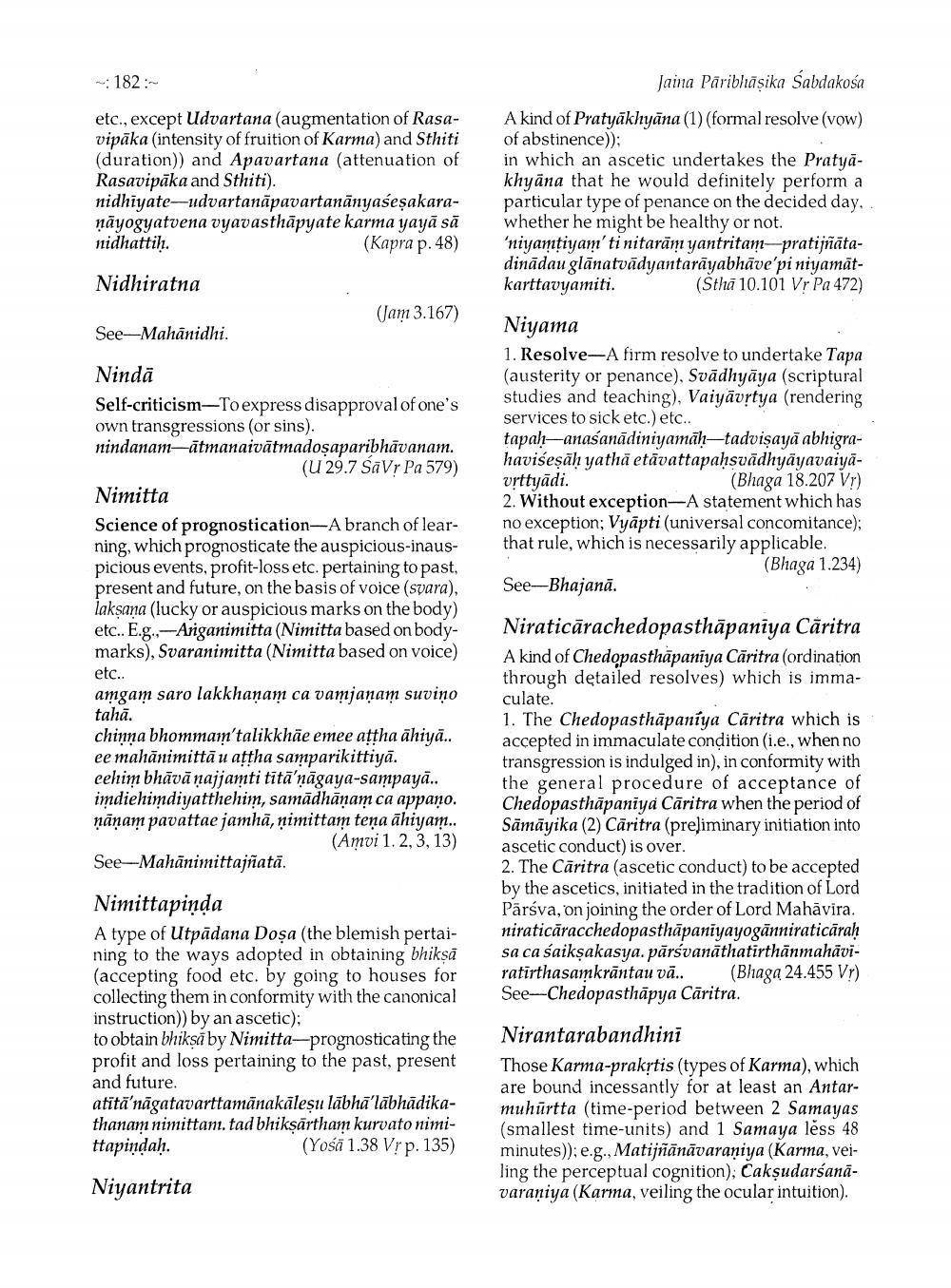________________
182:
Jaina Pāribhāṣika Sabdakosa
etc., except Udvartana (augmentation of Rasavipāka intensity of fruition of Karma) and Sthiti (duration)) and Apavartana (attenuation of Rasavipāka and Sthiti). nidhiyate-udvartanāpavartananyaseşakaranāyogyatvena vyavasthāpyate karma yayā sā nidhattih.
(Kapra p. 48)
A kind of Pratyākhyāna (1) (formal resolve (vow) of abstinence)); in which an ascetic undertakes the Pratyakhyāna that he would definitely perform a particular type of penance on the decided day.. whether he might be healthy or not. 'niyamtiyam' ti nitarām yantritam--pratijñātadinādau glānatvādyantarāyabhāve'pi niyamātkarttavyamiti. (Sthā 10.101 Vr Pa 472)
Nidhiratna
(Jam 3.167)
See-Mahānidhi.
Niyama 1. Resolve-A firm resolve to undertake Tapa (austerity or penance), Svādhyāya (scriptural studies and teaching), Vaiyāvrtya (rendering services to sick etc.) etc.. tapah-anasanādiniyamah-tadvişayā abhigrahavićeşāh yathā etāvattapaḥsvādhyāyavaiyavrttyādi.
(Bhaga 18.207 Vr) 2. Without exception-A statement which has no exception; Vyāpti (universal concomitance); that rule, which is necessarily applicable.
(Bhaga 1.234) See-Bhajanā.
Nindā Self-criticism-To express disapproval of one's own transgressions (or sins). nindanam-ātmanaivātmadosaparibhāvanam.
(U 29.7 SāVr Pa 579) Nimitta Science of prognostication-A branch of learning, which prognosticate the auspicious-inauspicious events, profit-loss etc. pertaining to past, present and future, on the basis of voice (svara), laksana (lucky or auspicious marks on the body) etc.. E.g., --Ariganimitta (Nimitta based on bodymarks), Svaranimitta (Nimitta based on voice) etc.. amgam saro lakkhanam ca vamjanam suvino tahā. chinna bhommam'talikkhãe emee attha āhiya.. ee mahānimittā u attha samparikittiyā. cehim bhāvā najjamti tītā’ņāgaya-sampaya.. imdiehindiyatthehin, samādhānam ca appano. nāņam pavattae jamhā, nimittam teņa āhiyam..
(Amvi 1.2, 3, 13) See-Mahānimittajñatā.
Niraticārachedopasthāpaniya Caritra A kind of Chedopasthăpaniya Cäritra (ordination through detailed resolves) which is immaculate. 1. The Chedopasthāpaniya Caritra which is accepted in immaculate condition (i.e., when no transgression is indulged in), in conformity with the general procedure of acceptance of Chedopasthāpaniya Caritra when the period of Sāmāyika (2) Cāritra (preliminary initiation into ascetic conduct) is over. 2. The Caritra (ascetic conduct) to be accepted by the ascetics, initiated in the tradition of Lord Pārsva, on joining the order of Lord Mahāvira. niraticāracchedopasthāpaniyayogānniraticārah sa ca saikşakasya. pārsvanāthatirthānmahäviratirthasamkrāntau vā.. (Bhaga 24.455 Vr) See--Chedopasthāpya Cāritra.
Nimittapinda A type of Utpadana Dosa (the blemish pertaining to the ways adopted in obtaining bhiksa (accepting food etc. by going to houses for collecting them in conformity with the canonical instruction)) by an ascetic); to obtain bhikṣā by Nimitta-prognosticating the profit and loss pertaining to the past, present and future. atitä'nāgatavarttamānakālesu lābhālābhādikathanam nimittam, tad bhikṣārtham kurvato nimittapindah.
(Yosā 1.38 Vr p. 135)
Nirantarabandhini Those Karma-prakstis (types of Karma), which are bound incessantly for at least an Antarmuhurtta (time-period between 2 Samayas (smallest time-units) and 1 Samaya less 48 minutes)); e.g., Matijnānāvaraniya (Karma, veiling the perceptual cognition), Cakşudarśanavaraniya (Karma, veiling the ocular intuition).
Niyantrita




